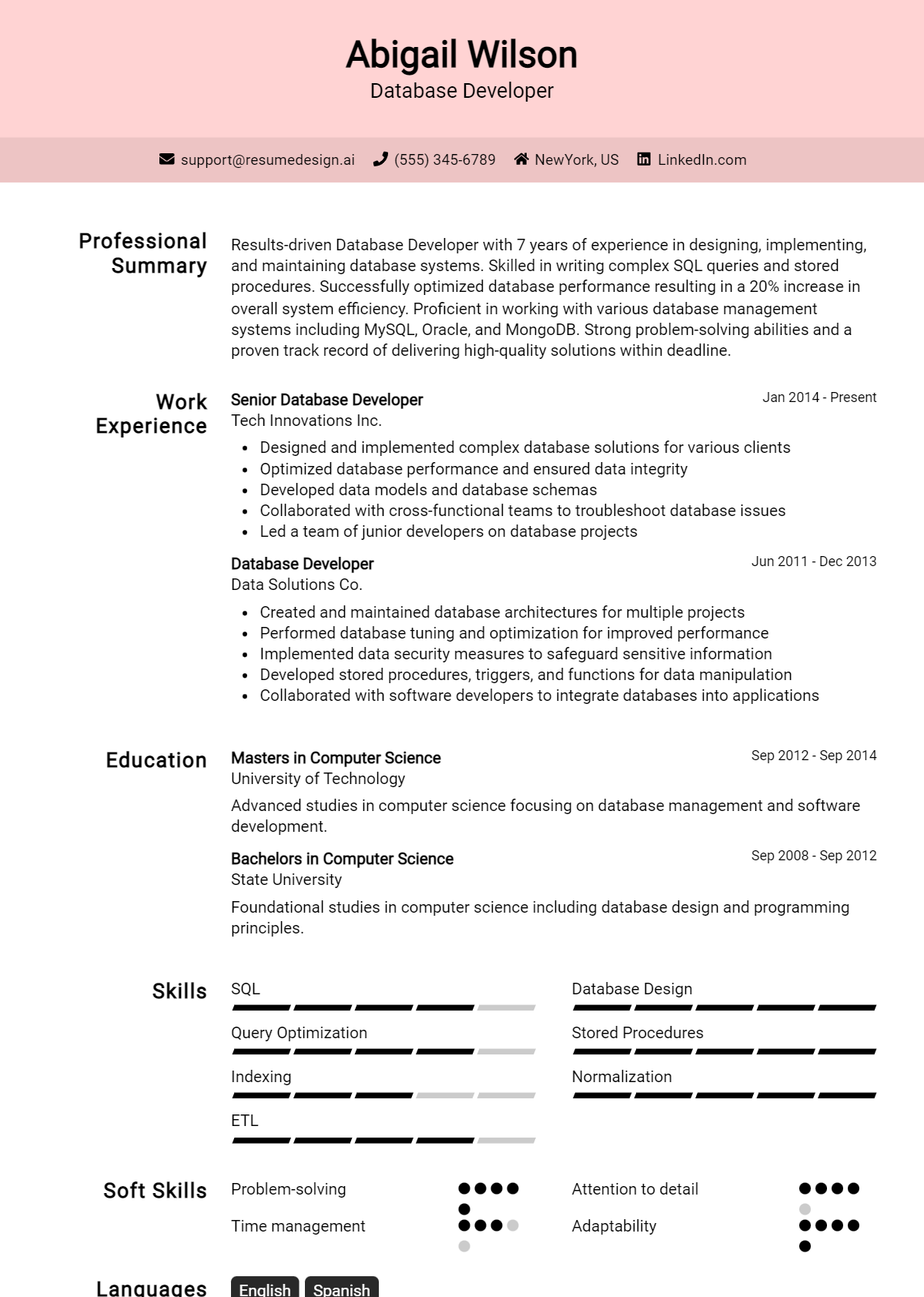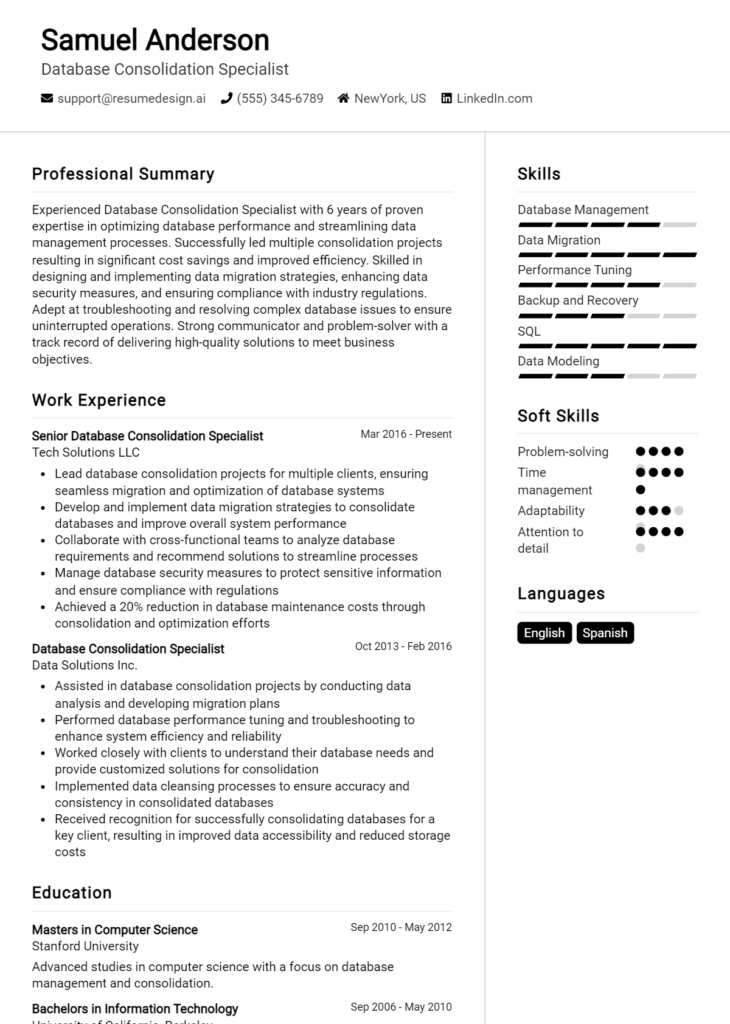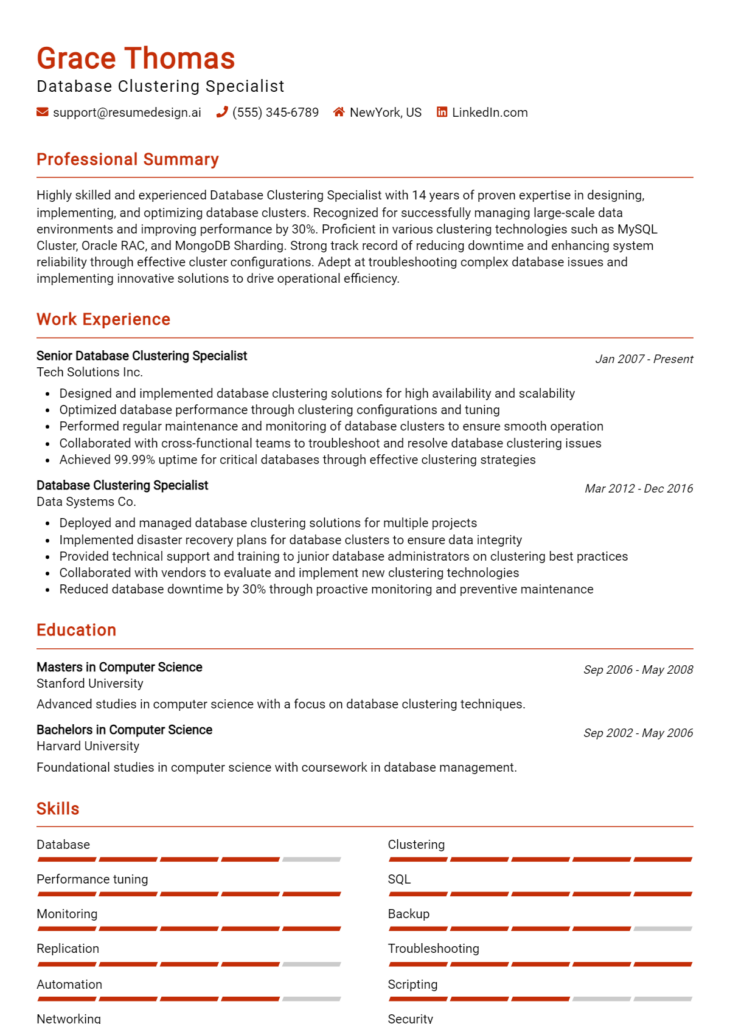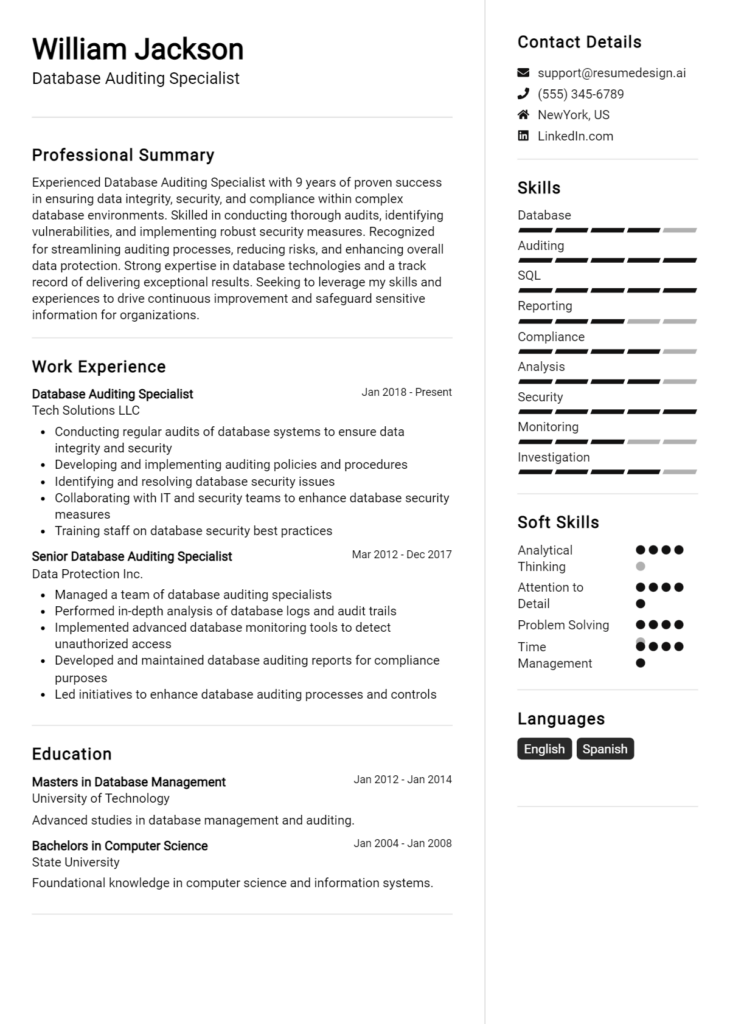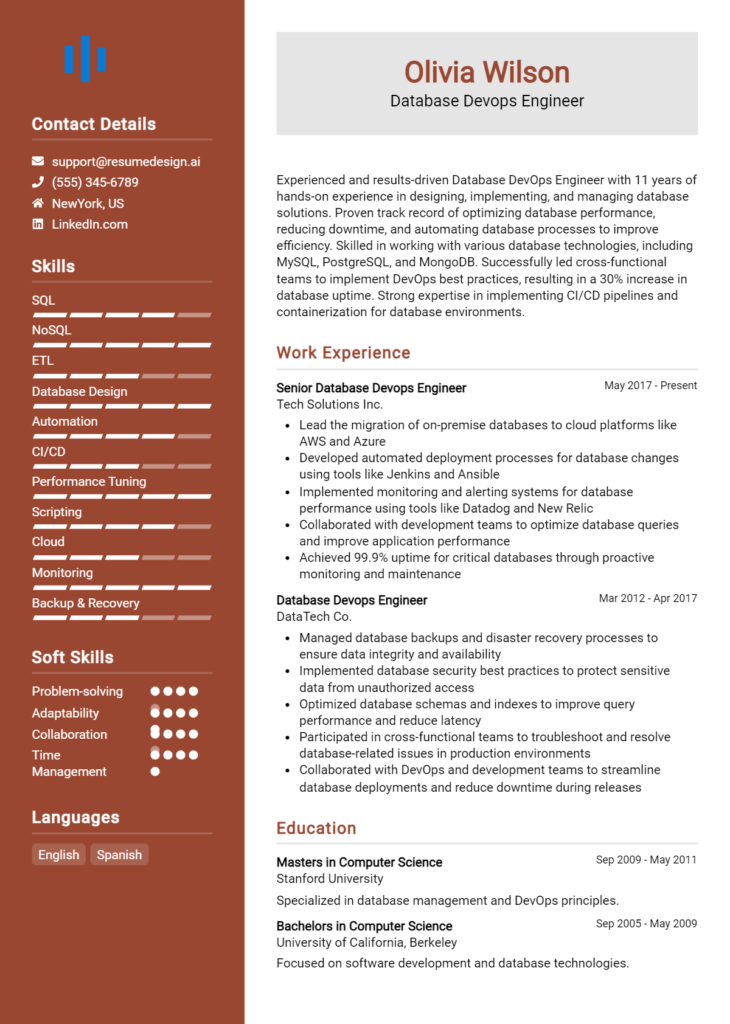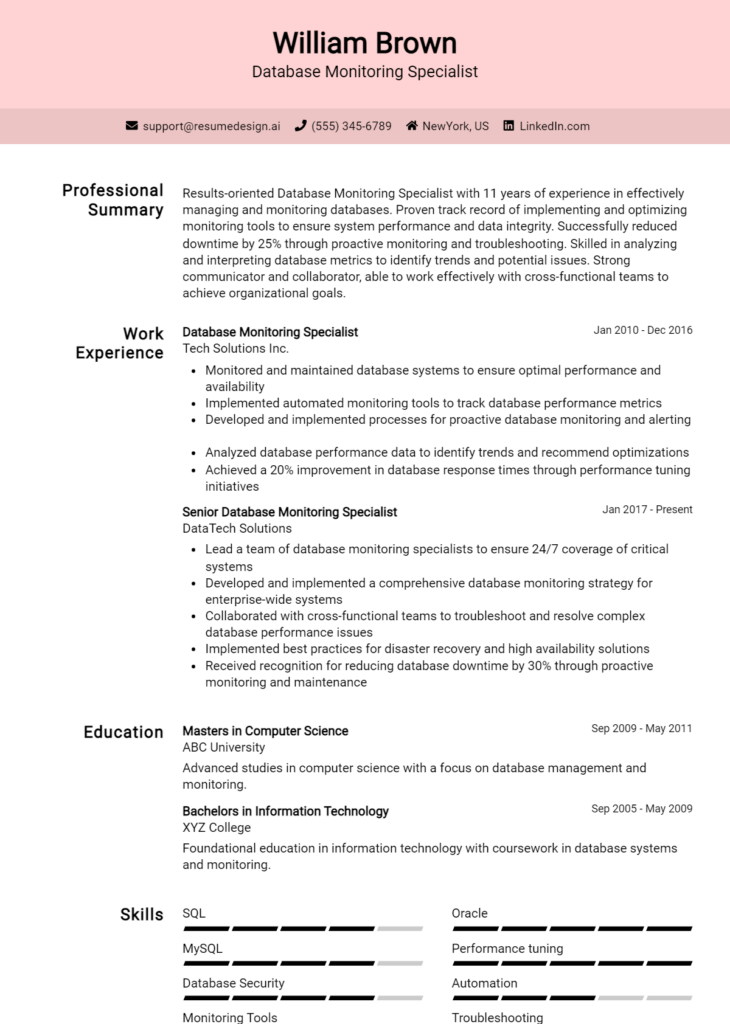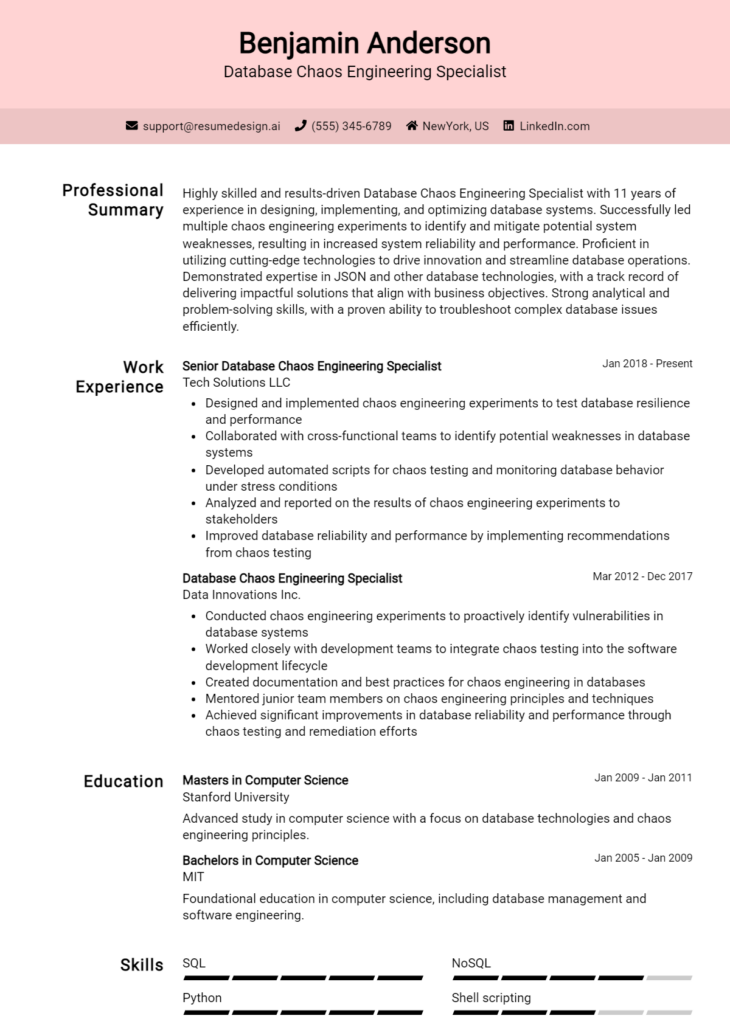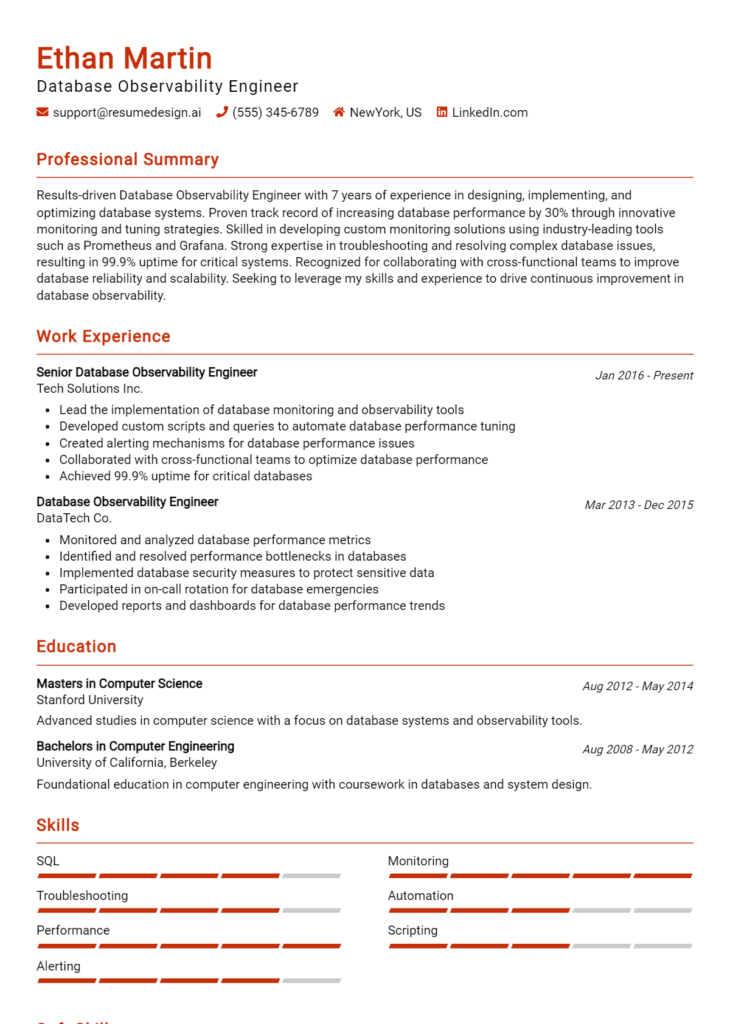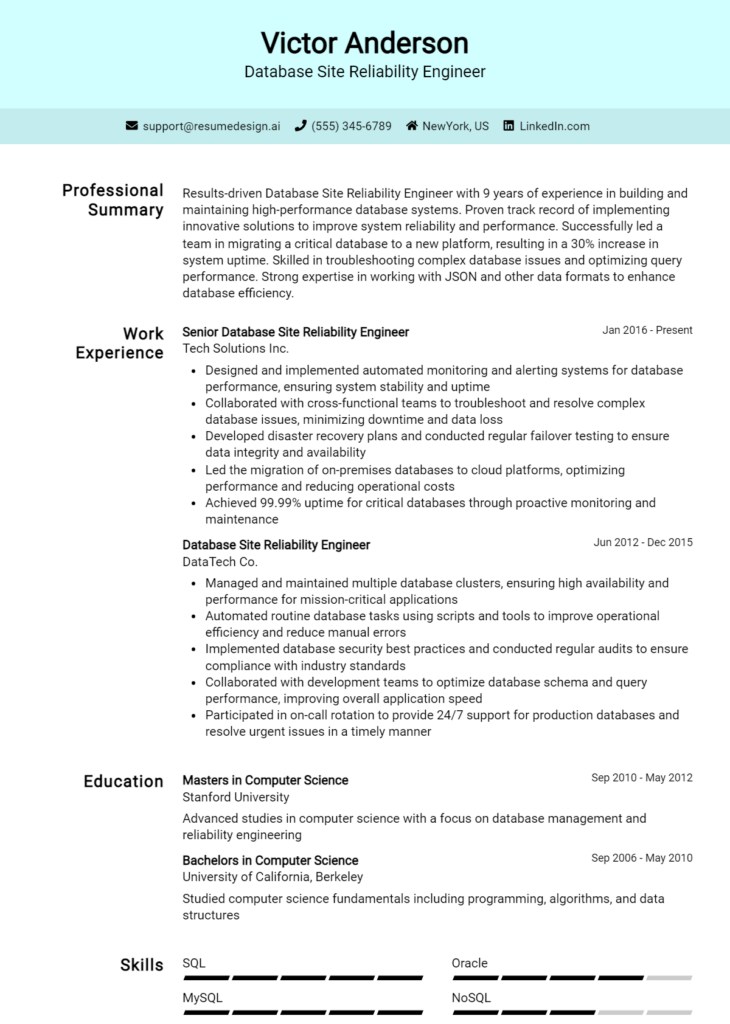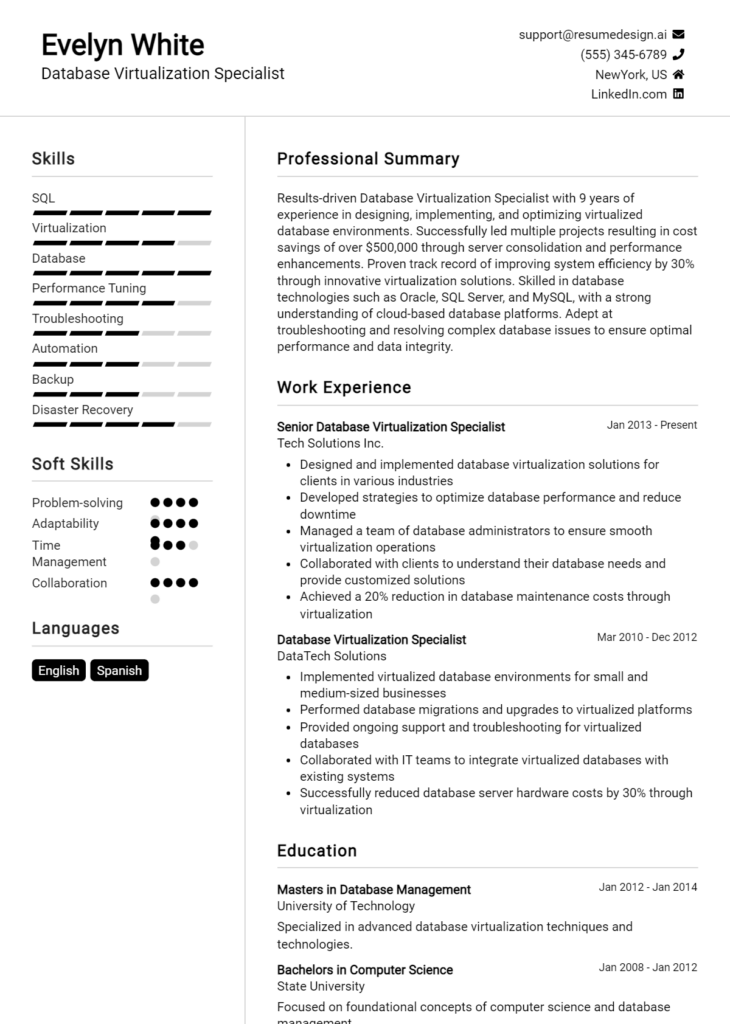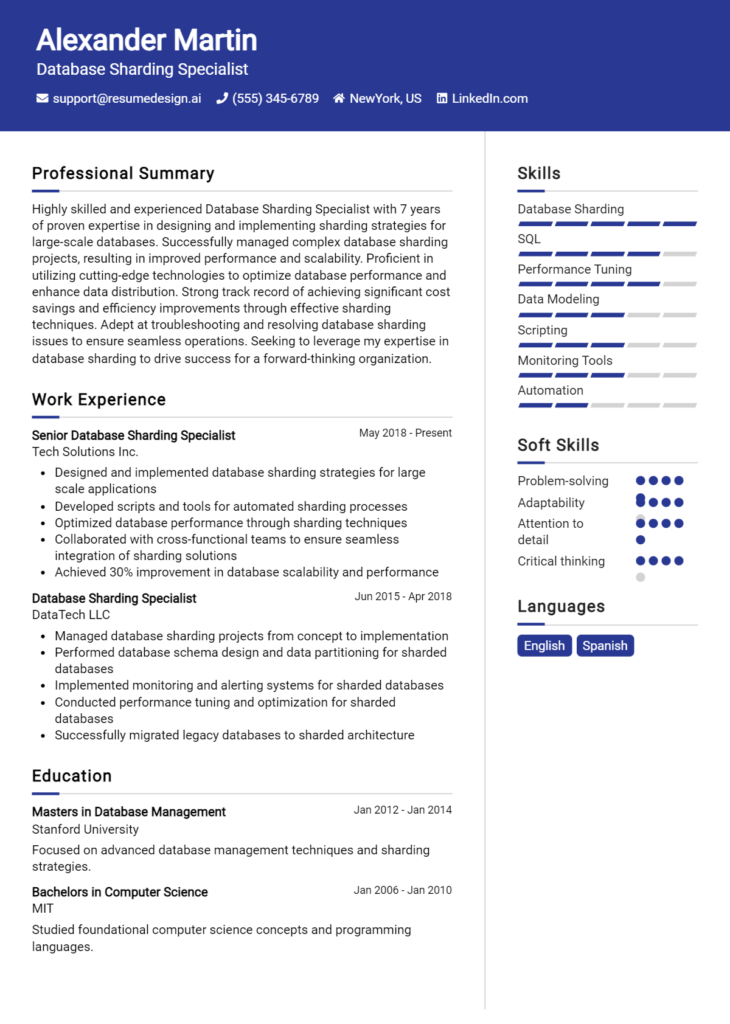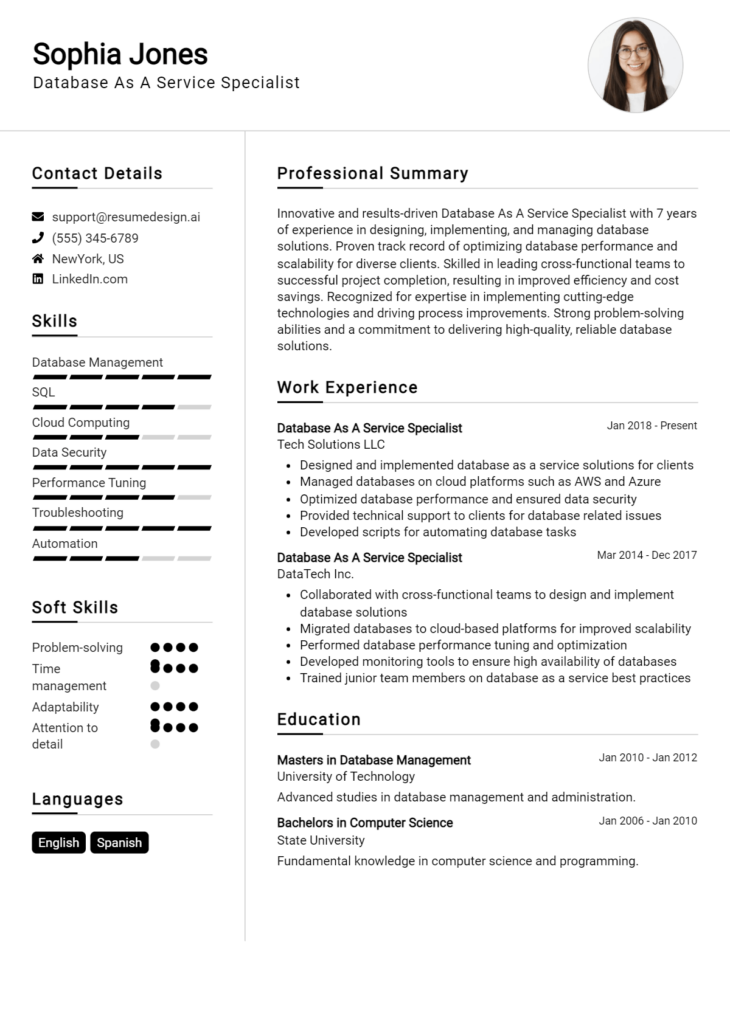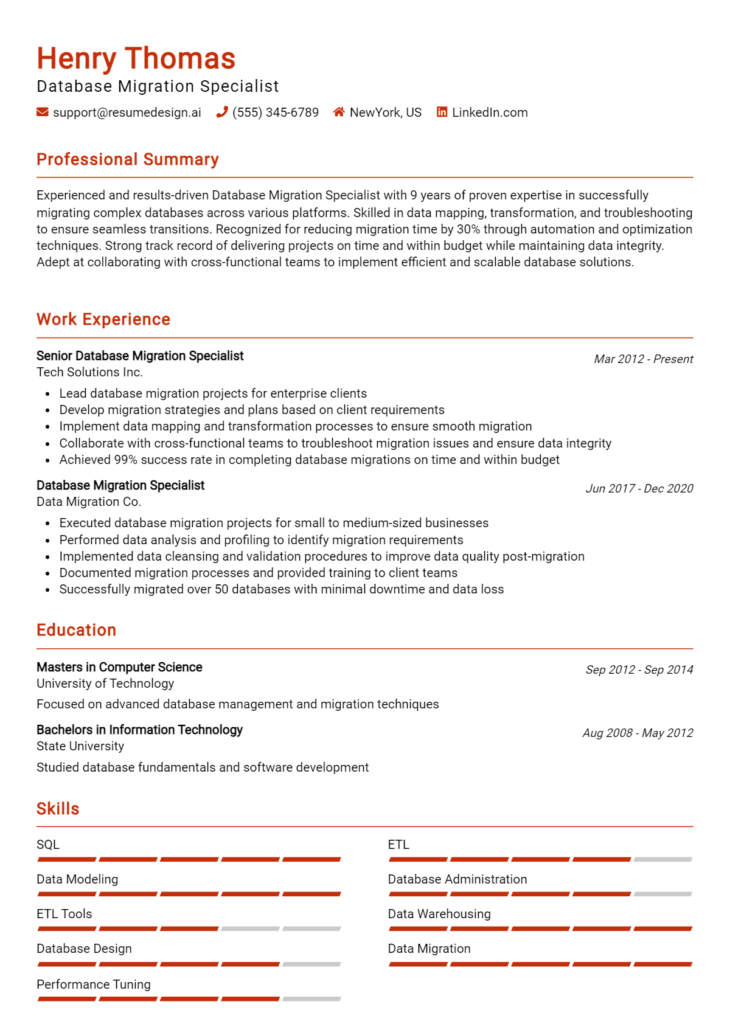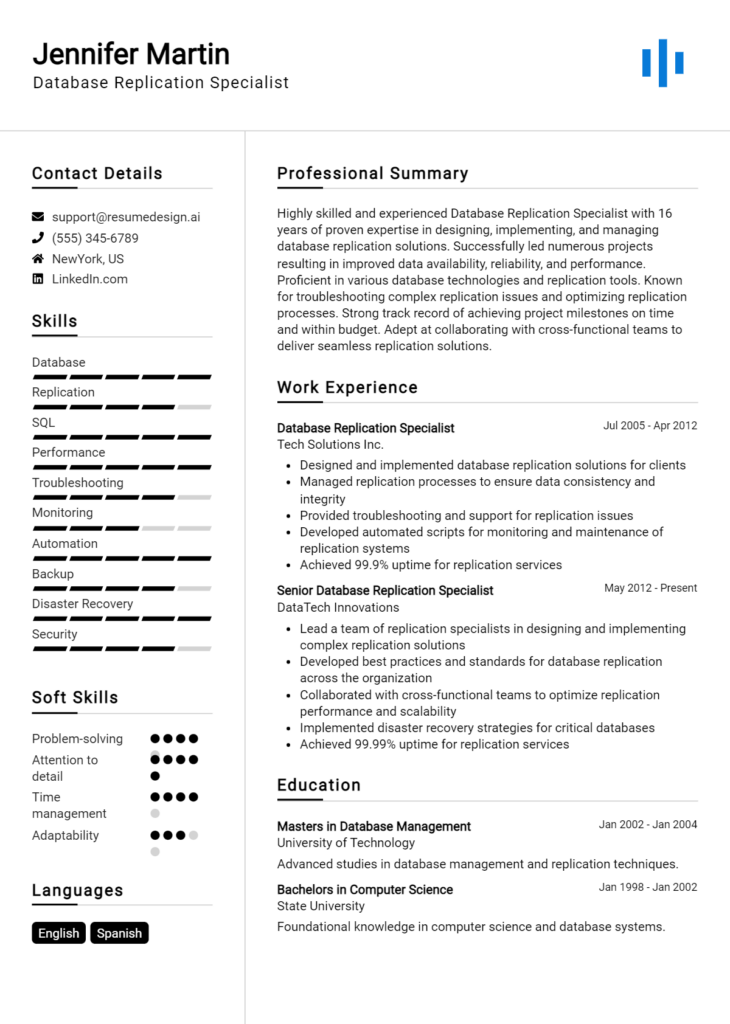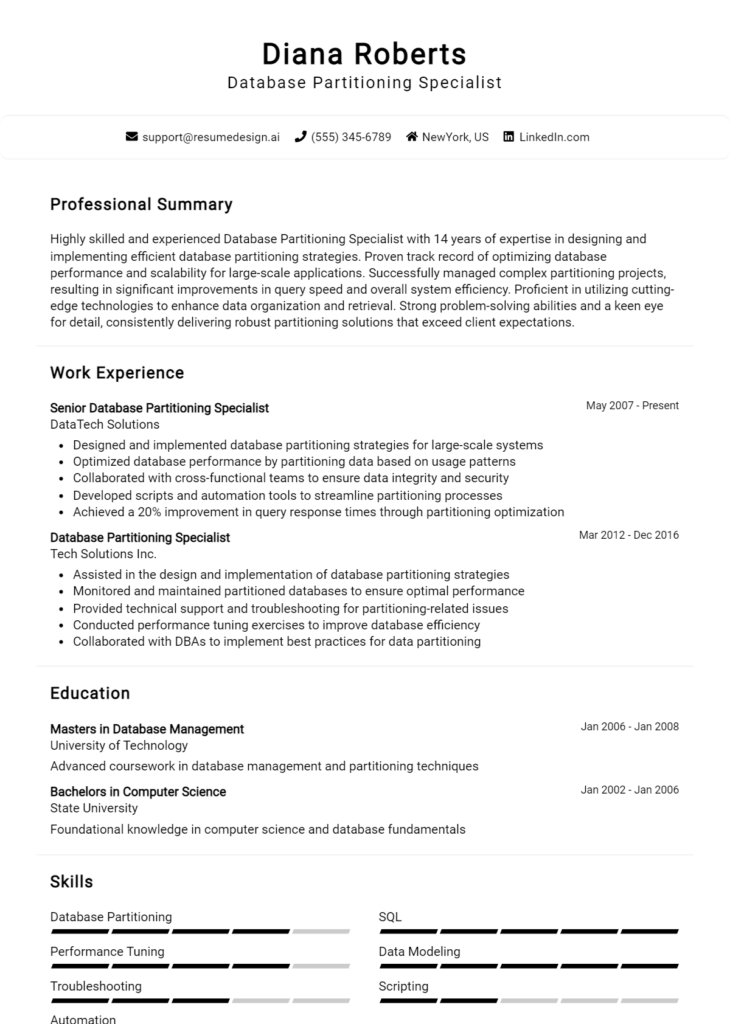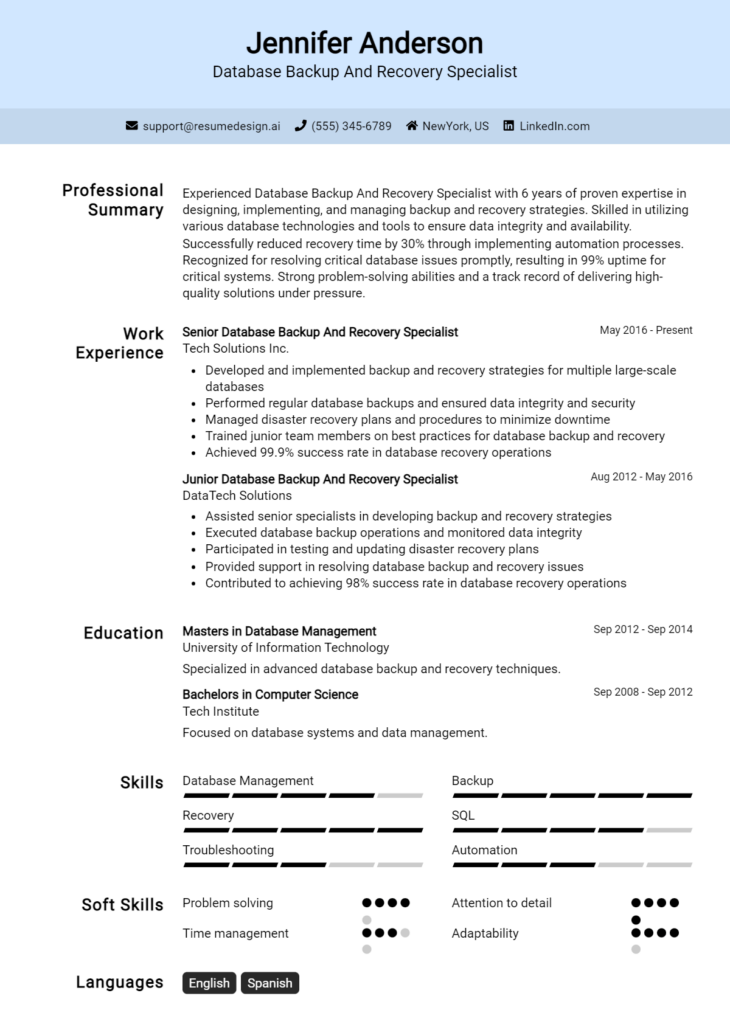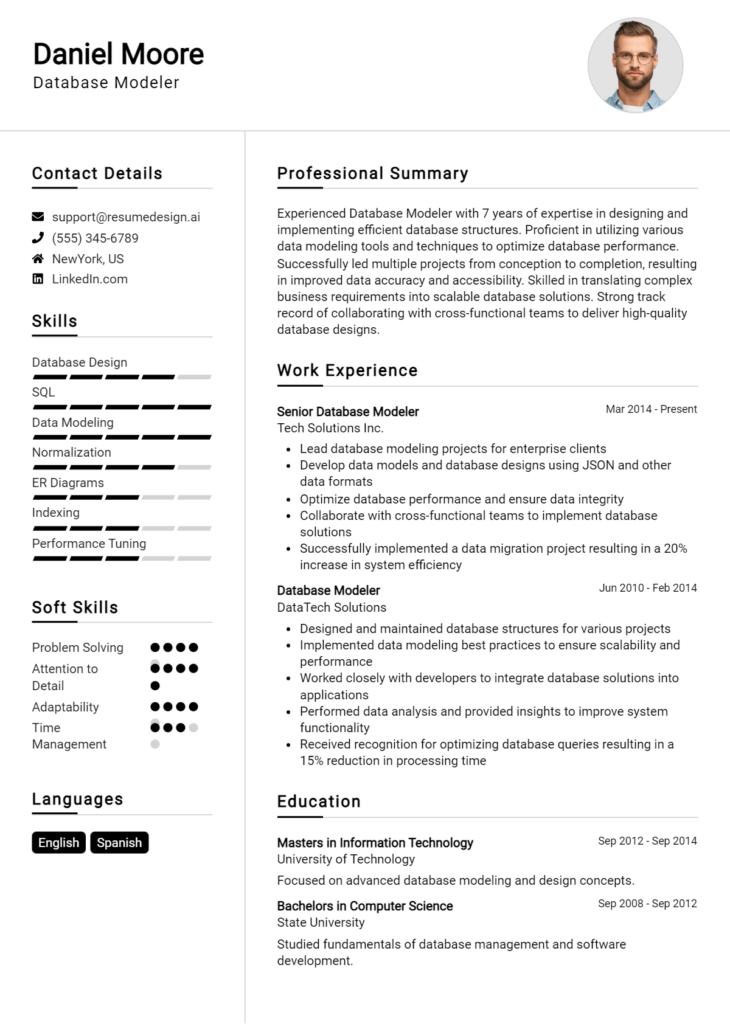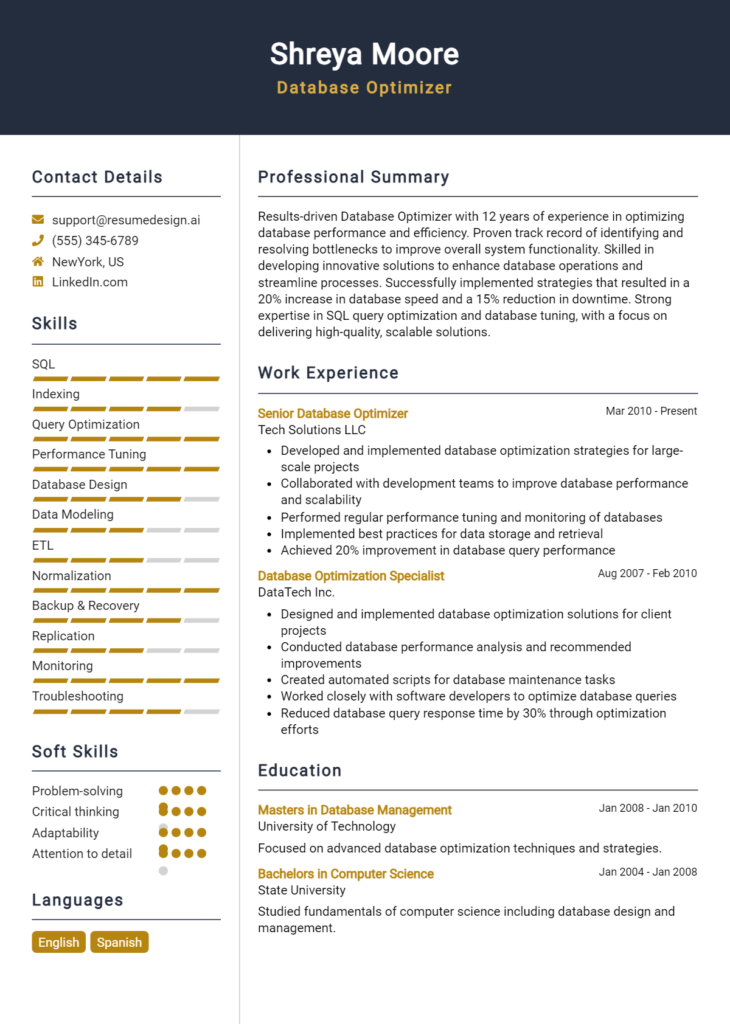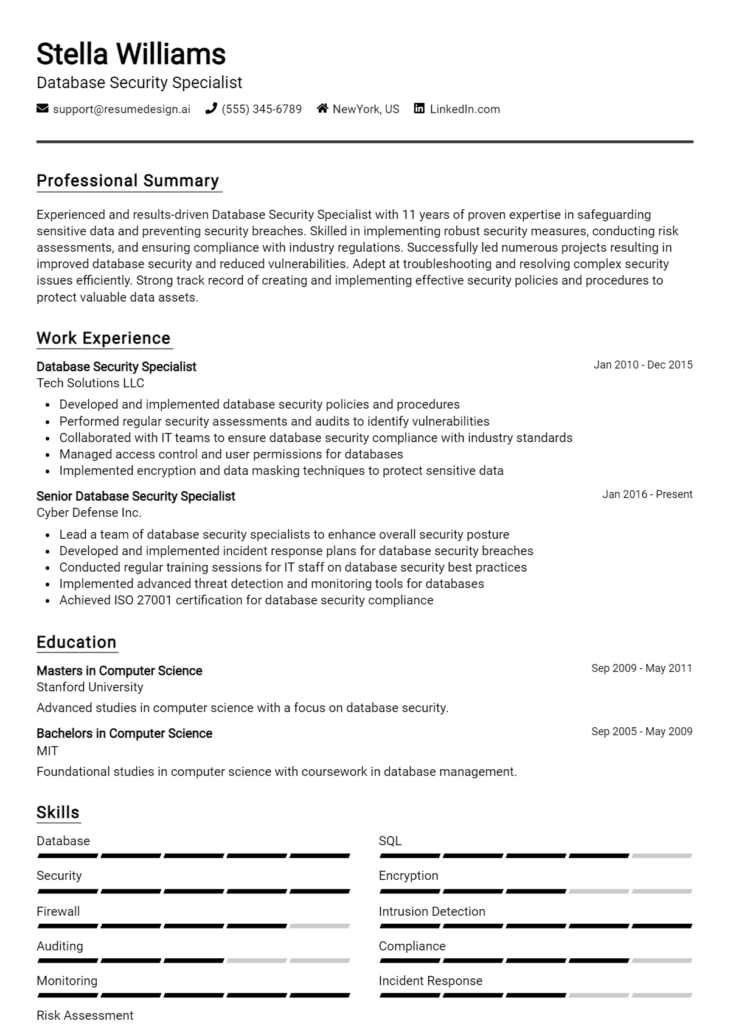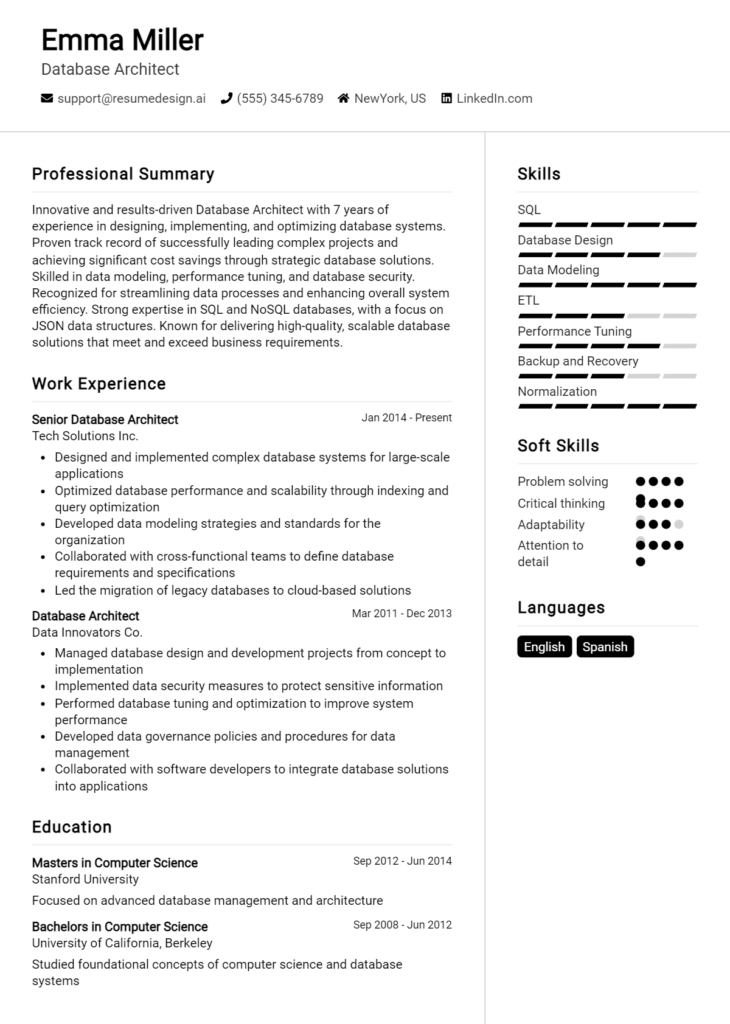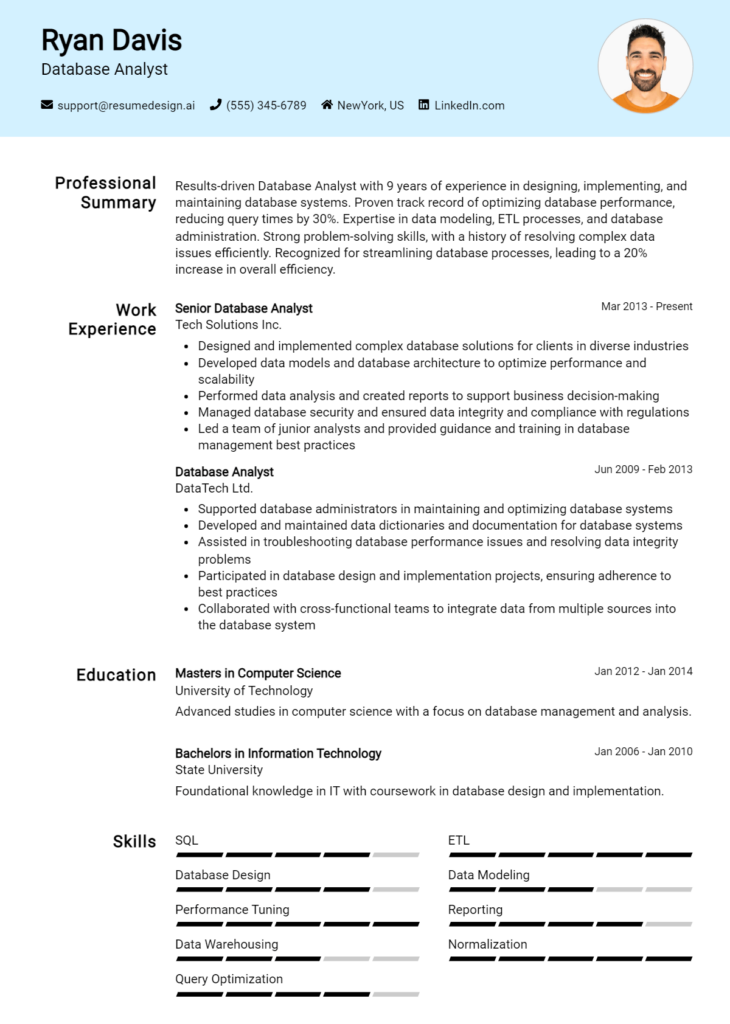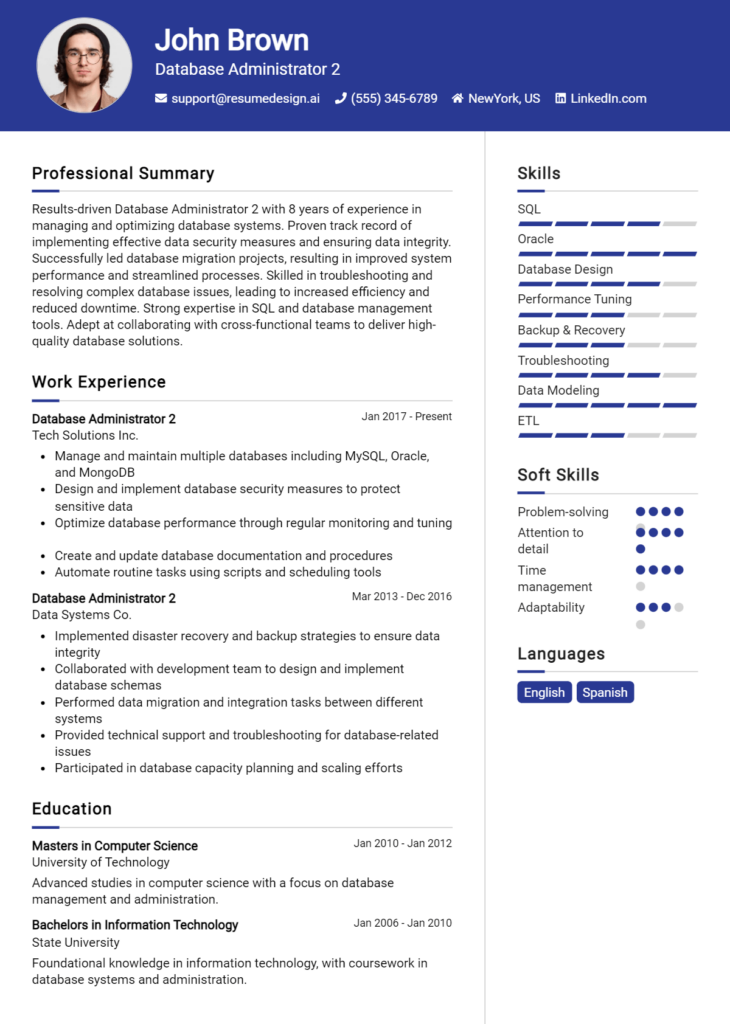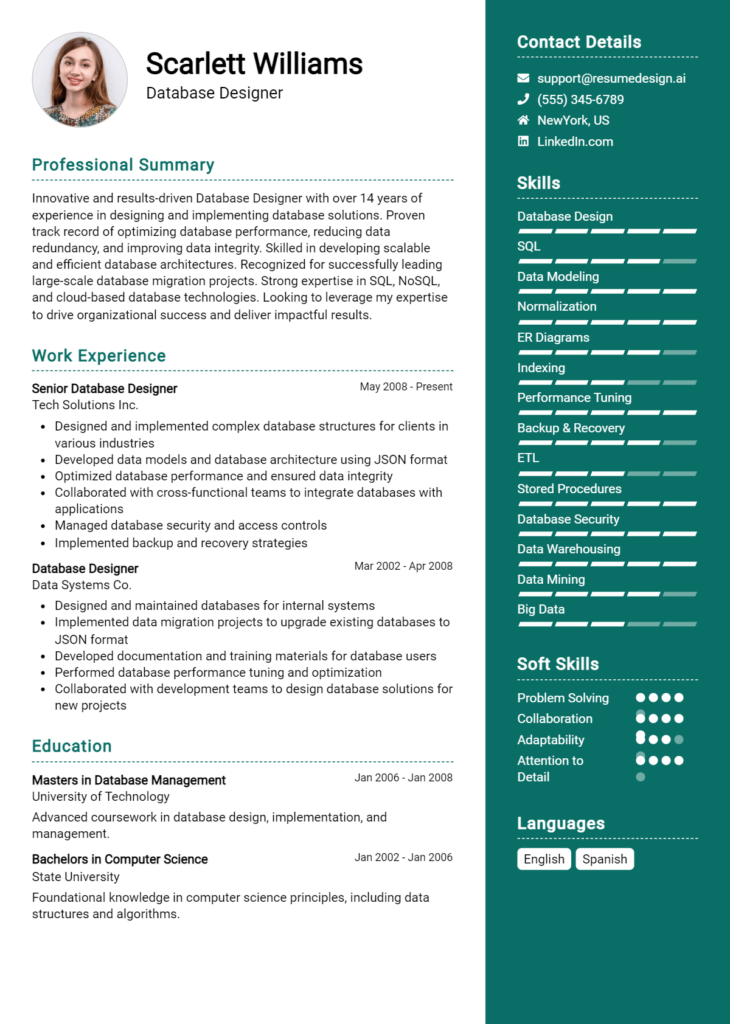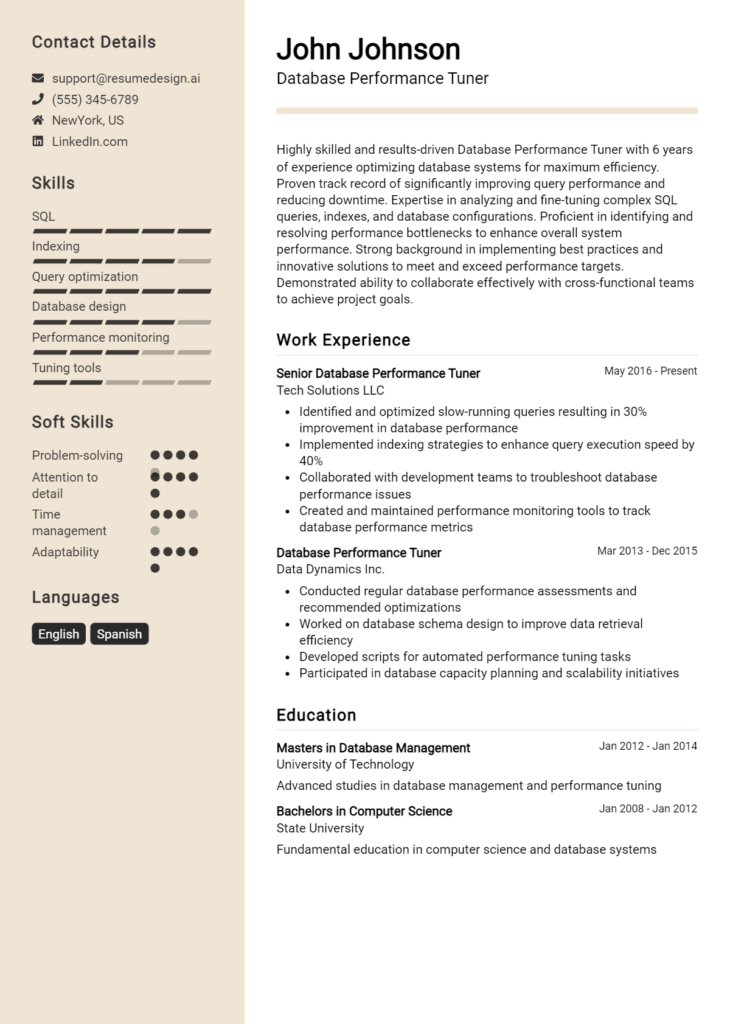Database Developer Core Responsibilities
A Database Developer plays a crucial role in managing, designing, and optimizing databases, ensuring data integrity and accessibility across various departments. They require strong technical skills in SQL and database management systems, complemented by operational understanding and problem-solving capabilities. By collaborating with IT, business analysts, and other teams, they help streamline processes and enhance data-driven decision-making. A well-structured resume that highlights these competencies is essential for showcasing their ability to contribute to organizational goals effectively.
Common Responsibilities Listed on Database Developer Resume
- Designing and implementing database systems to meet business needs
- Writing complex SQL queries for data retrieval and manipulation
- Optimizing database performance and ensuring data security
- Collaborating with cross-functional teams to define data requirements
- Developing data models and database architecture
- Conducting database testing and troubleshooting issues
- Documenting database design and changes for compliance
- Monitoring database health and implementing backup solutions
- Providing technical support and training to end-users
- Staying updated on database technologies and industry trends
- Participating in data migration and integration projects
- Ensuring adherence to data governance and best practices
High-Level Resume Tips for Database Developer Professionals
A well-crafted resume is crucial for Database Developer professionals as it often serves as the first impression a candidate makes on a potential employer. In the competitive landscape of technology and data management, your resume must effectively showcase not only your technical skills but also your achievements and contributions in previous roles. A strong resume can set you apart from other candidates by clearly demonstrating your expertise in database design, development, and maintenance. This guide will provide practical and actionable resume tips tailored specifically for Database Developer professionals, ensuring that your application stands out in the eyes of hiring managers.
Top Resume Tips for Database Developer Professionals
- Tailor your resume to align with the specific job description, highlighting relevant keywords and skills.
- Showcase your experience with various database management systems (DBMS) such as SQL Server, Oracle, and MySQL.
- Quantify your achievements by including metrics that demonstrate your impact, such as increased performance or reduced downtime.
- Highlight your proficiency in database design, normalization, and optimization techniques.
- Include any relevant certifications, such as Microsoft Certified Database Administrator or Oracle Certified Professional.
- Detail your experience with data modeling tools and ETL (Extract, Transform, Load) processes.
- List programming languages you are proficient in, including SQL, PL/SQL, and any relevant scripting languages.
- Demonstrate your understanding of data security and compliance regulations that affect database management.
- Incorporate soft skills such as problem-solving, teamwork, and communication that are vital for collaborating with other IT professionals.
By implementing these tips, you can significantly increase your chances of landing a job in the Database Developer field. A well-structured resume that emphasizes your skills and accomplishments will not only capture the attention of hiring managers but also demonstrate your readiness to contribute effectively to their teams.
Why Resume Headlines & Titles are Important for Database Developer
In the competitive field of database development, a well-crafted resume headline or title is crucial for making a strong first impression. These brief phrases serve as a summary of a candidate's key qualifications, effectively capturing the attention of hiring managers at a glance. A compelling headline can quickly convey relevant skills, experience, or accomplishments, helping to differentiate a candidate from the rest. It should be concise, impactful, and directly related to the specific job being applied for, ensuring that it resonates with the employer's needs and expectations.
Best Practices for Crafting Resume Headlines for Database Developer
- Keep it concise: Aim for a headline that is clear and to the point, ideally no more than 10 words.
- Be role-specific: Tailor your headline to reflect the specific position you are applying for.
- Highlight key skills: Include your most relevant technical skills or certifications in the headline.
- Showcase experience: If applicable, mention years of experience or a specific area of expertise.
- Use action-oriented language: Employ strong action verbs to convey your capabilities.
- Avoid jargon: Ensure that your headline is easily understandable without industry-specific terminology.
- Make it unique: Stand out by personalizing your headline to reflect what makes you different from other candidates.
- Align with the job description: Use keywords from the job posting to ensure relevancy and increase the chances of passing through Applicant Tracking Systems (ATS).
Example Resume Headlines for Database Developer
Strong Resume Headlines
"Results-Driven Database Developer with 5+ Years of Experience in SQL and NoSQL Systems"
“Expert in Data Modeling and Database Optimization Techniques for High-Performance Applications”
“Certified Database Administrator Specializing in Cloud Database Solutions and Security”
“Innovative Database Developer with Proven Track Record in Accelerating Data Processing Efficiency”
Weak Resume Headlines
“Database Developer Seeking Employment”
“Professional with Experience in Databases”
Strong headlines are effective because they immediately communicate a candidate's value and align with the job requirements, making it easier for hiring managers to see their potential fit for the role. In contrast, weak headlines fail to impress due to their vagueness and lack of specificity, leaving employers uncertain about the candidate's qualifications and making it difficult for them to stand out in a crowded job market.
Writing an Exceptional Database Developer Resume Summary
A well-crafted resume summary is crucial for a Database Developer as it serves as the first impression to hiring managers. This brief yet powerful overview highlights your key skills, relevant experience, and notable accomplishments, enabling you to quickly capture the attention of potential employers. A strong summary should be concise, impactful, and tailored to the specific job you are applying for, ensuring that it aligns with the needs of the organization and showcases your fit for the role.
Best Practices for Writing a Database Developer Resume Summary
- Quantify achievements: Use numbers and metrics to demonstrate your impact, such as project completion rates or performance improvements.
- Focus on relevant skills: Highlight the specific technical skills and tools that are most pertinent to the job description.
- Tailor the summary: Customize your summary for each application to reflect the requirements and responsibilities outlined in the job posting.
- Be concise: Aim for 2-4 sentences that deliver your core message without overwhelming the reader.
- Showcase key accomplishments: Mention significant projects or contributions that illustrate your expertise and value.
- Use action verbs: Start sentences with strong action verbs to convey your achievements more dynamically.
- Maintain professionalism: Keep the tone formal and avoid slang or overly casual language.
- Highlight problem-solving abilities: Emphasize your capability to address challenges and improve database performance or efficiency.
Example Database Developer Resume Summaries
Strong Resume Summaries
Detail-oriented Database Developer with over 5 years of experience in designing, optimizing, and maintaining complex database systems. Successfully improved query performance by 40% through advanced indexing techniques and efficient schema design.
Results-driven Database Developer skilled in SQL, NoSQL, and data modeling, with a proven track record of managing high-volume databases. Developed a data migration strategy that reduced downtime by 30% during system upgrades.
Experienced Database Developer with expertise in Python and database security protocols, achieving a 25% reduction in data breaches through proactive monitoring and encryption strategies in the last year.
Weak Resume Summaries
A Database Developer with experience in various technologies looking for a new opportunity to grow.
Skilled in database management and eager to contribute to a team. I have worked on several projects but cannot provide specific details.
The examples of strong resume summaries are considered effective because they provide quantifiable outcomes and specific skills that directly relate to the responsibilities of a Database Developer. They highlight measurable achievements, showcasing the candidate's impact on previous roles. In contrast, the weak resume summaries lack detail and specificity, failing to convey the candidate's unique qualifications or the results of their work, which makes them less compelling to hiring managers.
Work Experience Section for Database Developer Resume
The work experience section of a Database Developer resume plays a crucial role in showcasing a candidate's technical skills and professional journey. This section not only details the specific technologies and methodologies the candidate has mastered but also highlights their ability to manage teams and deliver high-quality products. By quantifying achievements and aligning experiences with industry standards, candidates can effectively demonstrate their value to potential employers, making this section a pivotal component of the resume.
Best Practices for Database Developer Work Experience
- Use specific technical terminology relevant to database development, such as SQL, NoSQL, and data modeling.
- Quantify achievements, such as the percentage of performance improvement or the number of users impacted by a project.
- Highlight leadership roles and team collaboration, illustrating your ability to work effectively in group settings.
- Detail the tools and technologies used in projects, ensuring they align with current industry standards.
- Include relevant certifications and training that enhance your qualifications as a database developer.
- Focus on results-driven language to convey the impact of your contributions on project success.
- Tailor your experience to match the requirements of the job description, emphasizing the most relevant skills.
- Showcase continuous learning and adaptation to new technologies and methodologies in database development.
Example Work Experiences for Database Developer
Strong Experiences
- Led a team of 5 developers in the migration of a legacy database to a cloud-based solution, resulting in a 30% reduction in query response time.
- Designed and implemented a new data warehousing solution that improved reporting capabilities, leading to a 40% increase in data retrieval efficiency for business intelligence tools.
- Developed a database optimization strategy that reduced storage costs by 25% while enhancing data access speeds for over 10,000 active users.
- Collaborated with cross-functional teams to integrate a new database system, contributing to a 15% increase in project delivery speed.
Weak Experiences
- Worked on database projects to improve performance.
- Assisted in the development of database systems with other team members.
- Involved in various database-related tasks.
- Participated in meetings about database management.
The examples listed above are considered strong because they provide specific metrics and outcomes that demonstrate the impact of the individual's work. They highlight leadership, collaboration, and technical expertise in a quantifiable manner, making the candidate's contributions clear and compelling. In contrast, the weak experiences are vague and lack measurable achievements, which makes it difficult to assess the candidate's capabilities or contributions effectively.
Education and Certifications Section for Database Developer Resume
The education and certifications section of a Database Developer resume plays a critical role in establishing the candidate's qualifications and expertise in the field. This section not only showcases the academic background of the individual but also highlights industry-relevant certifications and ongoing learning efforts that are crucial for keeping pace with evolving technologies. By including relevant coursework, certifications, and specialized training, candidates can significantly enhance their credibility and demonstrate their alignment with the requirements of the job role, thereby increasing their chances of securing an interview.
Best Practices for Database Developer Education and Certifications
- Focus on relevant degrees such as Computer Science, Information Technology, or Data Management.
- Highlight industry-recognized certifications like Microsoft Certified: Azure Database Administrator Associate or Oracle Certified Professional.
- Include specific coursework related to database design, SQL, data warehousing, and performance tuning.
- List any specialized training programs or boot camps that enhance core database skills.
- Ensure the certifications are current and reflect the latest technologies and methodologies.
- Use clear formatting to make the education and certifications easily readable and identifiable.
- Consider including relevant online courses or certifications from recognized platforms, such as Coursera or edX.
- Be concise but detailed enough to convey expertise without overwhelming the reader.
Example Education and Certifications for Database Developer
Strong Examples
- Bachelor of Science in Computer Science, XYZ University, 2020
- Microsoft Certified: Azure Database Administrator Associate, 2022
- Coursework in Database Management Systems, Data Modeling, and SQL Programming
- Oracle Certified Professional, Oracle Database 12c Administrator, 2021
Weak Examples
- Associate Degree in General Studies, ABC College, 2018
- Certification in Microsoft Office Applications, 2019
- Coursework in Basic Computer Skills
- Outdated certification in MySQL 5.0, 2017
The examples provided are considered strong because they directly relate to the skills and knowledge required for a Database Developer role, showcasing relevant degrees and current certifications that are valued in the industry. In contrast, the weak examples highlight irrelevant qualifications that do not align with the job requirements, making them less impactful and failing to demonstrate the candidate's suitability for the position. Strong qualifications reflect a clear commitment to the field, while weak ones may suggest a lack of focus or outdated knowledge.
Top Skills & Keywords for Database Developer Resume
In the competitive landscape of database development, showcasing the right skills on your resume is crucial for standing out to potential employers. A well-crafted resume not only highlights your technical expertise but also emphasizes your soft skills, which are essential for effective collaboration and problem-solving in team environments. Both sets of skills work in tandem to demonstrate your comprehensive understanding of database systems and your ability to communicate effectively with stakeholders. By focusing on these key skills, candidates can create compelling resumes that capture the attention of hiring managers.
Top Hard & Soft Skills for Database Developer
Soft Skills
- Excellent communication skills
- Problem-solving ability
- Team collaboration
- Attention to detail
- Adaptability
- Time management
- Critical thinking
- Creativity
- Conflict resolution
- Strong analytical skills
Hard Skills
- Proficiency in SQL and database management systems (DBMS)
- Experience with database design and normalization
- Knowledge of data modeling techniques
- Familiarity with ETL (Extract, Transform, Load) processes
- Proficient in programming languages (e.g., Python, Java, C#)
- Understanding of database security practices
- Experience with cloud database solutions (e.g., AWS, Azure)
- Knowledge of performance tuning and optimization
- Familiarity with NoSQL databases (e.g., MongoDB, Cassandra)
- Experience with version control systems (e.g., Git)
For more information on how to effectively showcase your skills and work experience, consider exploring additional resources that can help you refine your resume.
Stand Out with a Winning Database Developer Cover Letter
Dear Hiring Manager,
I am writing to express my interest in the Database Developer position at [Company Name] as advertised on [Job Board/Company Website]. With a robust background in database design, development, and management, coupled with a passion for optimizing data processes, I am excited about the opportunity to contribute to your team. My experience with SQL, NoSQL, and various database management systems positions me well to help [Company Name] enhance its data infrastructure and drive informed decision-making.
In my previous role at [Previous Company Name], I successfully developed and maintained complex database solutions that improved data retrieval times by 30%, significantly enhancing operational efficiency. I collaborated closely with cross-functional teams to understand their data needs and translate them into effective database designs. My proficiency in writing optimized SQL queries and stored procedures has allowed me to streamline operations and support data-driven initiatives, ensuring that business intelligence tools have timely and accurate data at their disposal.
I am particularly drawn to [Company Name] because of your commitment to innovation and excellence in [specific industry or project]. I admire your recent projects, such as [mention any relevant projects or initiatives by the company], and I am eager to bring my skills in database architecture and performance tuning to your team. I am confident that my proactive approach to problem-solving and my dedication to continuous learning will allow me to make a meaningful contribution to your organization.
Thank you for considering my application. I look forward to the opportunity to discuss how my background, skills, and enthusiasms align with the goals of [Company Name]. I am excited about the possibility of joining your team and contributing to your ongoing success.
Sincerely,
[Your Name]
[Your Phone Number]
[Your Email Address]
Common Mistakes to Avoid in a Database Developer Resume
When crafting a resume for a Database Developer position, it's crucial to present your skills and experience effectively to stand out in a competitive job market. However, many candidates inadvertently make common mistakes that can hinder their chances of securing an interview. To help you create a compelling resume, here are some pitfalls to avoid:
Lack of Specificity: Failing to provide specific examples of past projects or technologies used can make your resume too generic. Include details about the databases you've worked with, such as SQL Server, MySQL, or Oracle.
Ignoring Keywords: Many employers use Applicant Tracking Systems (ATS) to screen resumes. Neglecting to include relevant keywords from the job description can result in your resume being overlooked.
Overly Technical Jargon: While technical skills are essential, using too much jargon can alienate hiring managers who may not be as technically savvy. Aim for a balance that showcases your expertise without overwhelming the reader.
Neglecting Soft Skills: A successful Database Developer not only possesses technical skills but also communicates effectively and works well in teams. Omitting these soft skills can give an incomplete picture of your capabilities.
Formatting Issues: A cluttered or inconsistent format can make your resume difficult to read. Ensure that your layout is clean, with clear headings and bullet points for easy scanning.
Vague Job Descriptions: Listing job responsibilities without detailing your achievements or contributions makes it hard for employers to gauge your impact. Focus on quantifiable results where possible, such as performance improvements or cost savings.
Failing to Tailor the Resume: Sending out a one-size-fits-all resume can be detrimental. Tailor your resume for each application by highlighting the most relevant experiences and skills that align with the specific role.
Inadequate Education and Certifications: If applicable, ensure that you highlight any relevant degrees or certifications. Leaving out this information could make it seem like you lack the necessary background for the role.
Conclusion
As a Database Developer, your expertise in designing, implementing, and maintaining databases is critical to the success of any organization. Throughout this article, we've highlighted the essential skills and experiences that potential employers are looking for in candidates for this role, such as proficiency in SQL, database optimization, and data security measures. Additionally, we discussed the importance of showcasing your problem-solving abilities and teamwork skills, as these are vital in collaborative environments.
In conclusion, it's crucial to ensure that your resume reflects your qualifications and aligns with the expectations of hiring managers. We encourage you to take a moment to review your Database Developer Resume. Consider utilizing available tools to enhance your application. You can explore resume templates to find a format that suits your style, use the resume builder for a user-friendly experience in creating your document, and check out resume examples to gain inspiration from successful candidates. Don't forget to complement your resume with a compelling cover letter by accessing cover letter templates. Taking these steps can significantly increase your chances of landing that desired interview and advancing your career as a Database Developer.

